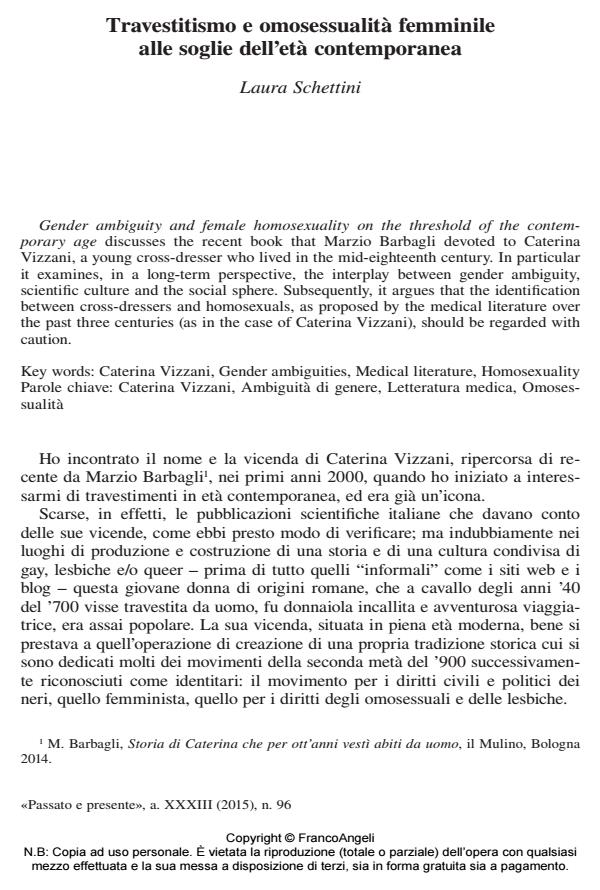Recensioni
Journal title PASSATO E PRESENTE
Author/s Laura Schettini, Ilaria Porciani, Aldo Agosti, Adriano Prosperi
Publishing Year 2015 Issue 2015/96
Language Italian Pages 40 P. 127-166 File size 230 KB
DOI 10.3280/PASS2015-096008
DOI is like a bar code for intellectual property: to have more infomation
click here
Below, you can see the article first page
If you want to buy this article in PDF format, you can do it, following the instructions to buy download credits

FrancoAngeli is member of Publishers International Linking Association, Inc (PILA), a not-for-profit association which run the CrossRef service enabling links to and from online scholarly content.
-Travestitismo e omosessualità femminile alle soglie dell’età contemporanea
- Uomini, donne e bambini in esposizione. Rappresentazione senza rappresentanza tra esotismo e primitivo
- Tasca e il fascismo. Un’indagine «in tempo reale»
- Terrorismo italiano.
Le porte di entrata e di uscita
Gender ambiguity and female homosexuality on the threshold of the contemporary Age
Discusses the recent book that Marzio Barbagli devoted to Caterina Vizzani, a young cross-dresser who lived in the mid-eighteenth century. In particular it examines, in a long-term perspective, the interplay between gender ambiguity, scientific culture and the social sphere. Subsequently, it argues that the identification between cross-dressers and homosexuals, as proposed by the medical literature over the past three centuries (as in the case of Caterina Vizzani), should be regarded with caution.
Women, men and children on display. Exoticism, primitivism and representation. Guido Abbattista’s Umanita in mostra. Esposizioni etniche e invenzioni esotiche in Italia (1880-1940) and Moving bodies, displaying nations: National cultures, race and gender in world expositions Nineteenth to Twenty-first century (edited by G. Abbattista)
Explores the living ethno-exhibitions which took place in the late nineteenth and early twentieth centuries, and analyzes their bio-political dimension. Porciani discusses these two very rich books, pointing out the broad set of issues presented in them and focusing on the complex issue of representation in European and African-American contexts.
Tasca and Fascism. A «real-time» study
Examines the latest volume of the «Annali Feltrinelli», including a large collection of writings in which Angelo Tasca sketches his analysis of the Italian Fascist regime, each step of which is used in his seminal book Naissance du fascisme (1938), a milestone in the Italian historiography of Fascism. These writings come from his vast archive, which since the 1960s has been a fundamental source for the history of many aspects of the Twentieth century, mainly for that of the Italian Communist Party and the Communist International. The writings collected in the book concern mainly the economic and foreign policy of the Fascist regime, and show some significant analogy both with the ones by Togliatti on the same subjects and with Gramsci’s prison notebooks. At the same time, they are also part of the debate of the French Left about the Fascist threat and the Popular Front. The volume also collects important essays of a number of Italian historians belonging to different generations, each of them analysing Tasca’s work under different aspects.
Italian terrorism. Entrance and exit doors.
Two recent books deal with the history of terrorism in Italy from two different and complementary perspectives: how the terrorists entered it, and how they exited it. In both cases there is a common Catholic background. On the one hand, the analysis of the origins of political violence in different local contexts sheds light on the ideological roots in the history of ideas and practices of religious legitimization of violent uprising against power which trace back to many centuries ago. On the other hand, the ending of the Italian «anni di piombo» (years of lead) is marked by such contexts as the prison as well as a religious language, with terms such as repentance, confession, pardon and redemption. These two books latch on to deep traits and remote events of Italian history and are of great interest for those who want to understand the original features of our history. Key words: Caterina Vizzani, Gender ambiguities, Medical literature, Homosexuality, Universal exhibitions, Bodies, Race, Colonialism, Fascism, Communism, Italy, Historiography, Archives, Anni di piombo, Political violence, Repentance, Terrorism, Catholic church Parole chiave: Caterina Vizzani, Ambiguità di genere, Letteratura medica, Omosessualità, Esposizione universali, Corpi, Razza, Colonialismo, Fascismo, Comunismo, Italia, Storiografia, Archivi, Anni di piombo, Violenza politica, Pentimento, Terrorismo, Chiesa cattolica
Keywords: Caterina Vizzani, Gender ambiguities, Medical literature, Homosexuality, Universal exhibitions, Bodies, Race, Colonialism, Fascism, Communism, Italy, Historiography, Archives, Anni di piombo, Political violence, Repentance, Terrorism, Catholic church
Laura Schettini, Ilaria Porciani, Aldo Agosti, Adriano Prosperi, Recensioni in "PASSATO E PRESENTE" 96/2015, pp 127-166, DOI: 10.3280/PASS2015-096008